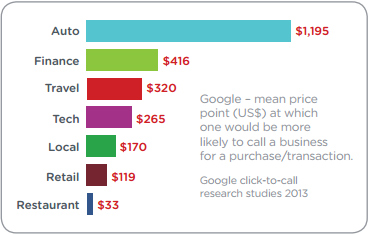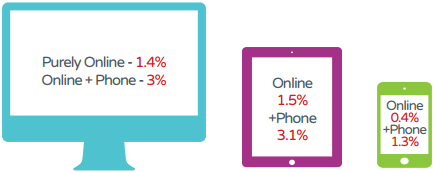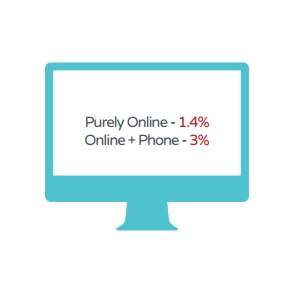Why the Telephone Will Still be Vital to E-commerce in 2014
You might think that telephone sales have been kicked to the sideline after the explosion of E-commerce sites over the last 15 years, but you would only be half right. New research produced by call tracking provider Response Tap shows that not only do consumers appreciate a well executed telephone support system when buying online, but more often than not they expect it. Despite this, most online businesses don’t fully appreciate the full impact that their telephone number has on their bottom line, especially for those that deal in high priced or 'consequential' purchases which tend to trigger insecurities in the customer.
This is almost counter intuitive to one of the key principles of e-Commerce: one should optimise and refine a customer journey until they require as little assistance or human interaction as possible on their way to completing a purchase. Many consumers want this unaided journey as well. Ideally, they will be presented with the right information they need to make decisions at exactly the right time, all the way to the checkout. However, as the cost of a potential purchase rises, the amount of information a customer requires exponentially increases until it reaches a point where a website simply cannot offer the personalised answers that a customer requires. Google conducted a study of this phenomenon and their findings are represented in the graph below.

As shown, even in e-commerce sectors which would traditionally not see a need for a comprehensive range of telephone support options, the point at which a customer would rather call is reasonably low. Most surprisingly, it is only $119 in the retail sector. This shows that to keep your most valuable customers from thinking twice about their purchases and abandoning their high value shopping cart, telephone support is a must.
In fact, 64% of the 2000 consumers surveyed as part of the Response Tap study stated that they get frustrated when they aren’t able to find an appropriate telephone number for the business they are trying to purchase from. 71% of those surveyed expected this frustration to be resolved within five minutes at the most, and if it isn’t then 48% will abandon their cart and never come back.
The study also found that one in three online shoppers would prefer to speak to someone on the phone before they finalise an important purchase. This figure rises to 41% for those who are aged 55 or over, making telephone support especially important for businesses that have a large number of customers within this demographic. Interestingly, in most cases it isn’t even the actual phone call which reassures these customers but rather, it is simply knowing that there is a comprehensive telephone support system in place for them if they have problems or questions concerning their order. 57% of respondents stated that a clearly displayed customer service number with convenient opening times adds additional trust and authority to an online retailer, while 56% say that they are more likely to return to a retailer who offers phone support.
So, consumers are clear: talking really does matter. The phone call is a fundamental part of the online experience and should be treated according to the level of importance that consumers obviously place on it. Get it wrong and you risk alienation. But is the answer as simple as it sounds -- more phone numbers and greater accessibility? To some degree, yes. Undoubtedly phone support has a positive effect on the consumer and influences their brand choices. The problem for business owners is their inability to track conversions that were made over the phone with the level of precise detail that digital analytics can provide. This makes it difficult to link phone calls back to digital marketing channels and to individual website visitors. Although 82% of the 250 marketing managers surveyed conceded that they feel it is important to link online and offline activities within their analytic data, more than half (52%) said that they don’t have a complete view of which online channels the phone calls they receive are originating from.
This is at odds with the findings of IBM's Global Chief Marketing Officers (CMO) study where nearly two thirds of CMOs stated that they think return on marketing investment will be the primary measurement of a business's effectiveness by 2015. To accurately gage this return on investment, phone conversions must be taken into account and attributed back to the marketing activity that generated the call. The graph below shows how much conversion rates are affected across multiple devices when calls are included in the calculations.

As you can see, on desktop and tablet the conversion rates double when telephone conversions which stem from these devices are taken into account, while conversion rates on mobile more than triple thanks to their click to call functionality.
Whether your business is only just beginning to implement phone support, or the telephone has been a part of the business for a while and you are only now starting to wonder how calls to your call centre connect to customer activity on your website, it should be clear that the telephone still plays a vital role in 21st century e-commerce. To see the full findings of the Response Tap report or download the white paper, visit their micro site at www.responsetap.com/offthegrid
blog comments powered by Disqus


















